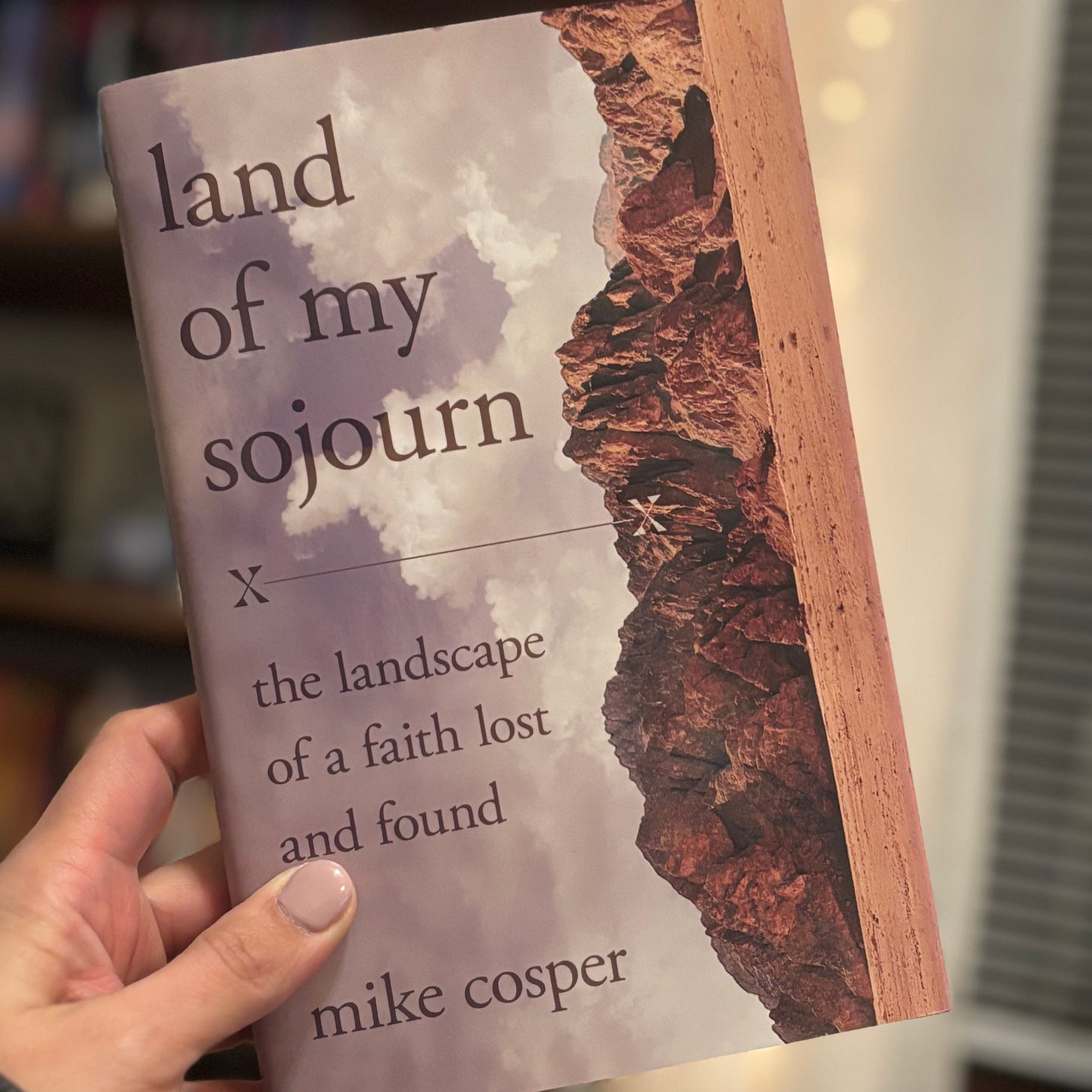Rethinking Faith: Using New Language, a Sojourn, and Living Embodied Lives
This month let's question Christianese and ditch it for better language, ponder Mike Cosper's Sojourn experience, and explore what it might mean to live an embodied life.
Rethinking Faith: December 2024
Welcome to the December issue of Rethinking Faith. This month we will question the Christianese language we use to describe salvation and consider some new words, ponder Mike Cosper’s book Land of My Sojourn, and explore what it might look like to live an embodied life.
Are We Using the Wrong Words When We Talk About “Salvation?”
I was praying the other day for a friend who has not yet chosen to believe that Jesus is the Son of God and came to reconnect them with their Creator.
I was praying the other day for a friend to get saved.
Do you notice the way those read differently?
Here’s what really happened. I was thinking about a friend of mine who has expressed some interest in God lately. As I thought about the hope I have for them, my brain used the words “get saved.” And then I instantly noticed how strange those words sound from anything but a Christianese perspective.
What does it mean to be saved? Saved from what? Death? Hell? The wrath of God? Is that all salvation is for? Just avoiding some distant ethereal judgement? No, I didn’t want my friend to simply “get saved.”
I wanted them to be reconnected to God.

My heart for them is to discover a connection with God made possible by Jesus and powered by the Holy Spirit. I want them to be transformed from the inside out. I want them to discover life that is truly life, peace that doesn’t make sense, and joy that bubbles up when we least expect it. I want them to suddenly realize that they don’t want the things they used to want because something is different inside. I want them to begin becoming the person they were always made to be.
It’s not that I don’t believe Jesus came to save us. He did. His very name means savior. Scripture is full of promises of salvation. But did Jesus just come to save us from a distant eternity without God? Is there more we are missing? Are there better words we could be using?
If all that Jesus came to do was save us from wrath, death, and judgement, I guess that’s good news for our eternity, but how does it affect our daily lives? It doesn’t. Maybe that’s one of our problems in the evangelical church. (And side note, telling people they need to “make Jesus the Lord of their life” and do all the things to obey him isn’t much better when it’s all done in our own effort and strength.)
What if Jesus came to save us from isolation and disconnection from God in this lifetime? What if He came to reconnect us?
If Jesus came to reconnect us, then a whole new world of possibility is open right now. Reconnection begins with “re” which means that we used to be connected. We were made to be connected.
When something is reconnected, it becomes part of something bigger. There is a power source surging through again. Christmas lights turn on. Water flows freely. Batteries charge. People come to life in a way that makes them realize they used to be dead. Isn’t this better news than just “being saved?”

Some people get after me for nit picking. They don’t think things like words or phrases matter much in the big picture. But I disagree. Our words and definitions do matter if they are affecting our lives. I don’t want people to simply focus on being saved from future judgement and miss the truth that our daily lives can be radically transformed by connection with God. Look at Jesus’ life! This is what He came to do. This is what He did.
Many of us are triggered by certain Christianese words and phrases. But even if we aren’t, I think it would be beneficial to rethinking how we use them. Take the time to ponder what they mean and what we are actually trying to say. Are we communicating truth in a way that people will understand? Are there words that we need to retire from our vocabulary? Are there better words we could use instead?
What words and phrases would you like to change?
“The Sojourn I knew—the story I’d told and the dream I’d held tightly for all those years—had come to an end.” ~ Mike Cosper
When I listened to Mike Cosper host the Rise and Fall of Mars Hill podcast, I could tell that he had had his own experiences with messy church culture and toxic leadership. When you’ve been through it yourself, you can pick up on things like that. You hear what people say, but mostly what they don’t say.
We’ve created podcasts telling the truth and written books about spiritual abuse and toxic pastoral leadership. We know there’s a serious problem within many of our churches, but somehow we haven’t figured out how to stop it yet.
Some people create from their pain and woundedness, and it’s bloody. I’m not sure anyone is actually healed or helped. But other people wait until their wounds become a scar. Then they write from a place of understanding, brokenness, honesty, and humility in a way that brings hope. That’s Mike Cosper in his book, Land of My Sojourn.”
He tells just enough of his story without adding extra sensational details. Readers catch on, and if they’ve been through it themselves—like I have—they know intuitively what hasn’t been written. Mike let’s us feel his pain, disillusionment, frustration, and sense of deep loss. Then he mixes that story with ponderings from the lives of Peter and Elijah and explorations of the Holy Land. It’s a beautiful book. It’s also pretty short and I was able to devour it in two days.
“One of the stark realities of the experience of disorientation is that not everyone gets through it. I know many people whose status as true believers was disrupted by pain and suffering and whose faith never recovered. As someone who stood in the darkness, that makes sense to me. Others hit the point of despair and lose hope all together, and sadly that makes sense to me too.”
~ Mike Cosper, Land of My Sojourn
Only someone who has lived it can write these words. They resonate with me. And yet on the other side of suffering, pain, and disillusionment, Mike offers hope. He hasn’t given up on Jesus or even on the church, and Jesus hasn’t given up on him.
Are We Living Fully Embodied Lives?
I was reading through Mike Cosper’s book, Land of My Sojourn, and the story of Elijah after Mount Carmel hit me in a new way. If you remember, Elijah has this amazing conflict with the prophets of Baal on the mountain in the presence of the nation of Israel. They have a contest to see which god can produce fire for a sacrifice. With a dramatic finish, Yahweh wins, fire falls from heaven, and it burns up everything on the altar including the rocks and water in the trough. The people of Israel scream, “The LORD, He is God!” and they execute the prophets of Baal (who were sex traffickers and child sacrificers). But instead of being able to enjoy the celebration, Elijah finds out that evil Queen Jezebel wants him dead and runs for his life. Talk about a spiritual high followed by a dark night of the soul.

Exhausted and depressed, Elijah finds refuge under a juniper tree where he falls asleep. God doesn’t condemn him for a lack of faith, ask him to keep performing, or insist he do anything even remotely spiritual or moralistic. God simply lets Elijah sleep, feeds him with food from an angel, tells him to sleep some more, and then feeds him again so that he will have energy for the journey ahead. God takes care of Elijah’s body.
After Elijah arrives at the cave on Mount Saini, God meets him with a gentle question, “What are you doing here?” Then instead of being in any of the intense, experiential things that happen next, God comes to Elijah in a whisper. He understands what Elijah can handle in his fragile state, and that is where God connects with him and encourages him.
Too often in my Christian experience, there has been a gnostic twist to things. The spiritual is always good, but the body and any bodily needs or desires are bad. I podcasted about this last year. And yet, here is God simply caring for Elijah’s physical and emotional needs.
We are holistic human beings. We cannot separate pieces of ourselves; everything is connected. Physical, emotional, mental, psychological, and spiritual—we are complicated. And God made us this way on purpose! Yes, every part of us has been corrupted and mangled by sin, but there is still beauty and goodness that remains in all the parts of us.
I couldn’t help but think of my job as a behavior specialist as I read about Elijah. God offers him food, water, and a nap. I do the same things with my kiddos when they are a wreck. A little rest, a snack, and some water can do wonders for any of us. (And some sunshine and fresh air—we are basically plants.)
So I have some questions. Are we living as fully embodied humans? Are we connected with our bodies? Are we caring for them? Are we avoiding spiritualizing or spiritual bypassing? Are we acknowledging our genuine needs and making space for those needs to be properly and healthily met?
I believe that is where God wants to connect with us. In our moments of weakness and need like He connected with Elijah.
As always, I'd love to hear your thoughts, questions, or comments. You can find me on Threads, Instagram, Facebook, my website, and on my original podcast. I’d love to connect with you on any of these places!
My new podcast, Religious Rebels, can be found on YouTube, Apple Podcasts, Spotify, iHeart Radio, and more. Episodes drop every other Sunday at noon on YouTube and 5pm on Substack and everywhere you listen to podcasts.
You can also order an autographed copy of my book, Religious Rebels: Finding Jesus in the Awkward Middle Way by clicking on the button below. Or you can find it on Amazon.









Touched base with me. I could have restacked and quoted more.
Connect in mind, body and spirit.
“Connect” is my word of 2025.
So far I have:
Connect with God
Connect with others
Connect with my gifts.
We are complicated. And God can use each one of us to glorify Him if we get connected.
Rereading this as it spoke to me in my own faith journey. So many words you have written are the same things I have often pondered in my adult years. I grew up in the 70s and revivals were a huge part of my church experiences. Getting people saved, many times fear based. You don’t want to leave this place and die in a car wreck and spend eternity in hell. Many of us were “rededicating” our lives to God over and over. Then I spent a majority of my early adulthood wondering if I had said the right prayer. Was I living life right etc. Eventually I worked it out. I am so grateful for people that share their struggles, their questions and pondering’s. We are all on a journey of connecting and reconnecting. I think that happens daily as we walk with God. We hear often, we were not made for this world. True in many ways, but also not so true. We were made for connection with God. He wants that relationship with us and when we focus on this-connecting with God-then I think we become more relatable to others as they witness how we navigate our own faith. Instead of constantly focusing on “not going to hell”. Fear is never a motivator to change. Thank you for sharing and my word for the year is connect too.